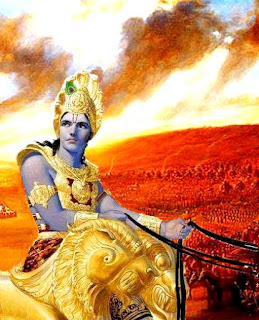Sri
Sri Prema Samput p.
52 "Only
to increase the love of my devotees for me, do I bestow hardship upon them and
in so doing incur my own sorrow, yet I welcome that distress."
In the imaginary scene of the poem Krishna is speaking
confidentially to a friend sometime after Kurukshetra, in a mixture of
reminiscences and emotions, from Dwarka,
to the rasa dance, to the meeting in Kurukshetra. In doing so Krishna reveals the secret depths
of his love. Krishna never puts his devotees through something which He does
not take also upon Himself.
SD
32.21 "Even
when I removed Myself from your sight by suddenly disappearing, I never stopped
loving you."
GC
23.39
"O dearest Gopis! The first
separation has been most difficult for me."
My solitude nestled
in the recesses of
the night,
and like shadows that
come forth
with brighter light,
its agony too appeared,
by moonlit memories
of their love for
Me.
With the ardent
desire
for a tidal wave
of this ocean of
their love and my love,
to flood the hearts
and the stars,
I disappeared,
causing their
lamentation,
and thirstily I
drank from the same (1)
chalice of longing
emotions
welling up from purest
love.
Spying unseen
upon their
absorption and tribulation
while they searched
for Me,
with breathless
glances,
in incessant meditation
unwavering, on Me
only,
I also endured separation, (2)
and could wait no
more
for their embraces (3)
as the tears of love,
furrowing their
faces,
were gushing like ecstatic
rivers
of their sweetest
love.
And impatient,
covetous of the
mellows
flourishing in their
hearts,
in that innermost
hollow I stood,
a restless spectator
of their total love,
incapable of
repaying
the wealth of
devotion
of my most beloveds.
In the most famous
and also infamous (4)
state of Godhood of
being self-satisfied,
no one could fathom
why I cried,
why my heart sighed,
breathless from
feeling separation,
dragged and
dependent on
their selfless
adoration.
I smiled anew
to soothe their
hearts,
and hiding my
anguish,
asked for
forgiveness.
They offered their
fragrant ghee of love, (5)
and the dense honey
of sulkiness,
thus plundering my
love,
so that I,
delighted, sold myself. (6)
1) GC 23.46 "Bhakti to me produces
nectar".
2) Sri Sri Prema Samput pg.50 "He is
also filled with sadness as he remains hidden from his devotees, [...] on top
of that he then has to tolerate the slander that he is indifferent to those who love
him."
3) GB 12.7 Comm. "Not after a long time, but very quickly, since I am not able to
bear delay in meeting them, I, putting them on the shoulders of Garuda, bring
them to My dhama."
4) SD 82.44 Comm. "But my dear girlfriend - Krishna replied -
if this is true, I must be God, but still I am conquered by your love and
devotion."
Godhood is also infamous to Krishna
because in His qualities as the Absolute (Controller, Self-satisfied etc) which
are revered but also commonly misunderstood, His sweetness and eagerness to
love as Nanda Kishor is thwarted.
5) AVC Pg.279 (Rasa Dance Begins) "He (Krishna) wanted to create unity among the
opposing parties of Radha and Candravali."
6) KS Anu 170 "I have come now. Please
experience me directly at every moment."









